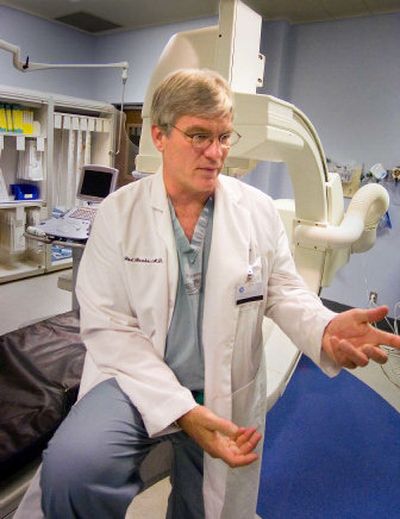Anti-stroke technique also helps memory

A medical procedure to open the clogged carotid artery of potential stroke victims not only reduces the risk of stroke, but actually improves memory and cognitive function, according to a study by a group of physicians at Sacred Heart Medical Center.
“We set out to prove that this technology would not hurt people,” said Dr. Rodney Raabe, radiologist and leader of the research team. “But we’re actually seeing people getting better.”
Raabe called ramifications of the study huge in terms of quality of life for people suffering from dementia as a result of reduced blood-flow to the brain. Stroke is the No. 1 reason people are discharged to nursing homes. Currently, there is no treatment for dementia.
“Now, for the first time, for this select group of people, ‘Yes, we can make you think better. Oh, and by the way, we can reduce your risk of stroke by 50 percent.’ “
The team studied the effects on mental function of the carotid stent procedure, in which a metal mesh stent is inserted through a small incision in the patient’s thigh and is implanted in the carotid artery in the neck to increase blood flow. The stent is inserted after a balloon moves plaque lining artery walls out of the way.
A third of strokes are caused by carotid blockages. Carotid stenting, performed at both Sacred Heart and Deaconess Medical Center, has only been approved by the U.S. Food and Drug Administration in the last five years as an alternative to painful neck surgery called carotid endarterecomy.
Both procedures can release “microdebris,” plaque particles that also can diminish mental ability or even cause death if the particles make their way to the brain.
Raabe’s team set out to learn whether deploying a tiny umbrella-like filter to catch the debris would reduce mental impairments in patients on whom carotid stenting is performed.
Of 51 patients enrolled in the study over the past two years, 30 could be evaluated after six months. Subjects were given memory and “executive function” tests before and after the procedure.
“Virtually all showed improvement in neurocognitive function,” Raabe said. “We never thought that was possible.”
Also remarkable was that patients with reduced carotid artery blood flow who were assumed to be “asymptomatic,” or not showing signs of stroke, showed improved memory and mental functions, Raabe said. Some even reported seeing brighter colors after the procedure.
Raabe, who is affiliated with Inland Imaging and the Inland Vascular Institute, has become somewhat of a medical celebrity since presenting his findings at a medical conference in Toronto on Saturday. He appeared on the Today Show on Sunday after a story about his research appeared in The New York Times.
This summer, a colleague, Dr. Robert Burr, a neuropsychologist, will travel to Greece and Raabe will go to China to present the team’s findings. Such research is rare for a group of five physicians at a hospital like Sacred Heart, which is not affiliated with a university.
“The collection of talent here rivals many universities, even though we are a small town,” Raabe said. He thanked the hospital for making it possible.
The research will soon be the subject of TransAtlantic Carotid Intervention Trials in Europe and the United States after review by the National Institutes of Health in June. Raabe and Burr will head up the U.S. portion of the trials.